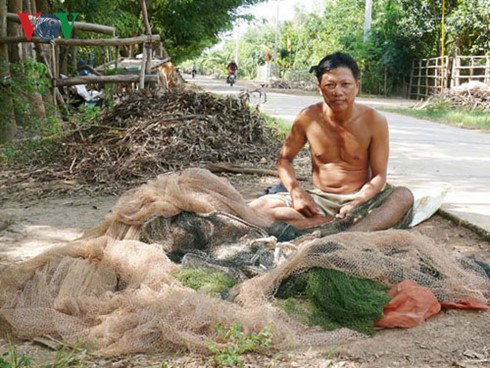(VOVworld) – In recent years, the lives of farmers in the Mekong River Delta who depend on the rising-water season have been impacted by saline intrusion, depleted soil, and the exhaustion of aquatic resources and water. VOV reports on efforts by local farmers to step up agricultural restructuring to reduce the negative effects.
 |
| People in the Mekong Delta live on aquaculture (Photo: VOV) |
Each year in the past the floods season brought alluvium, fish, and other aquatic resources to the Mekong Delta, to the great benefit of the local people.
But in recent years, climate change and the construction of upstream dams have drastically altered the situation.
Do Van Liet, a resident of Dong Thap province, who has fished during the flood season for a dozen years, said: “Fishing is dying out because of limited floodwater. I have changed to raising eels. The state has also given us some capital for cow breeding.”
The long-term solution for delta farmers is to switch to crops that use less water or shift to other occupations.
Farmers in the Mekong Delta can no longer count on abundant natural resources. They need to restructure their crops, rely more on non-agricultural services, and increase the market value of their farm produce.
Dr. Duong Van Ni of Can Tho University said: “Alluvium is dwindling because of hydropower dams in the upper Mekong River and its branches. Alluvium flows into the Mekong Delta have almost halved. If more hydropower dams are built, the amount of alluvium will be even less. There will be no alluvium to raise the level of the delta.”
The agricultural sector often warns farmers to look to aquaculture to increase their income, and has encouraged local people to raise eels in earthen ponds, raise frogs or freshwater fish in small bamboo rafts, or raise snails in their rice fields.
Associate Professor Nguyen Hieu Trung, Deputy Head of the Institute for Climate Change Studies at Can Tho University, said: “We should study the issues which originate from the upper Mekong. We should check water flows in the upper river and use that information to make careful preparations.”
To deal with the challenges brought by climate change to the Mekong Delta, the Ministry of Agriculture and Rural Development has outlined policies involving value chains, large fields, restructuring of rice growing areas, new irrigation systems, and hardier rice varieties. These policies have seen promising results. Mekong Delta provinces are being encouraged to work closely with and share information with areas upstream in order to manage and use the Mekong River water more effectively and sustainably.